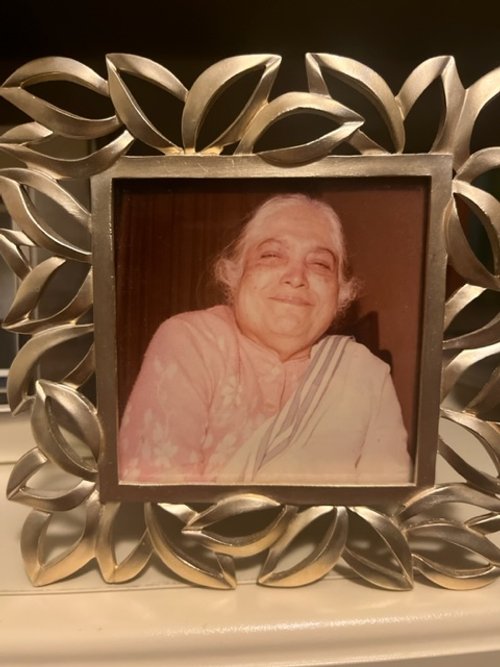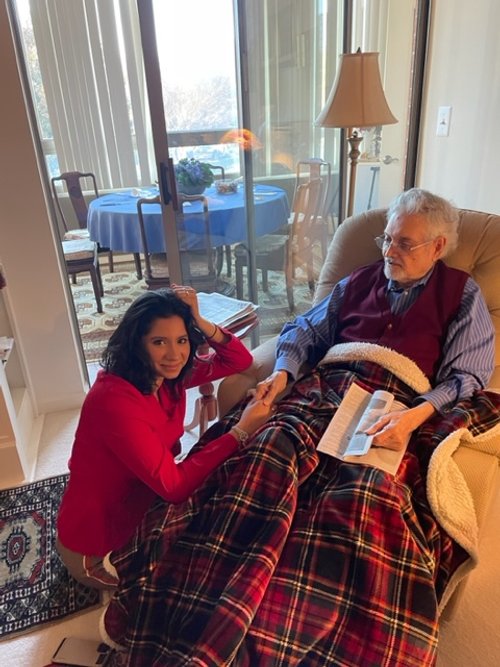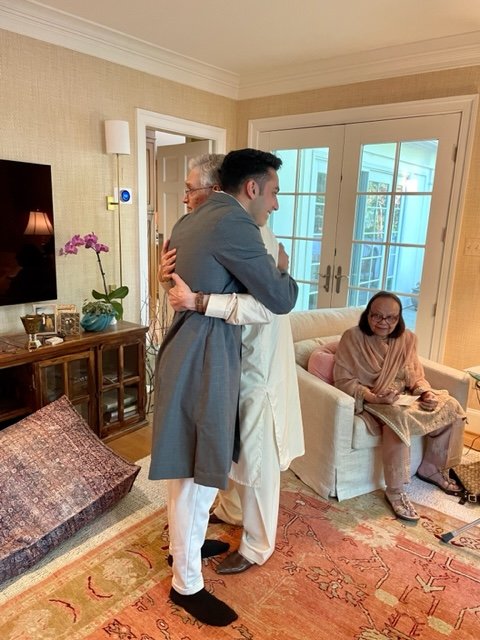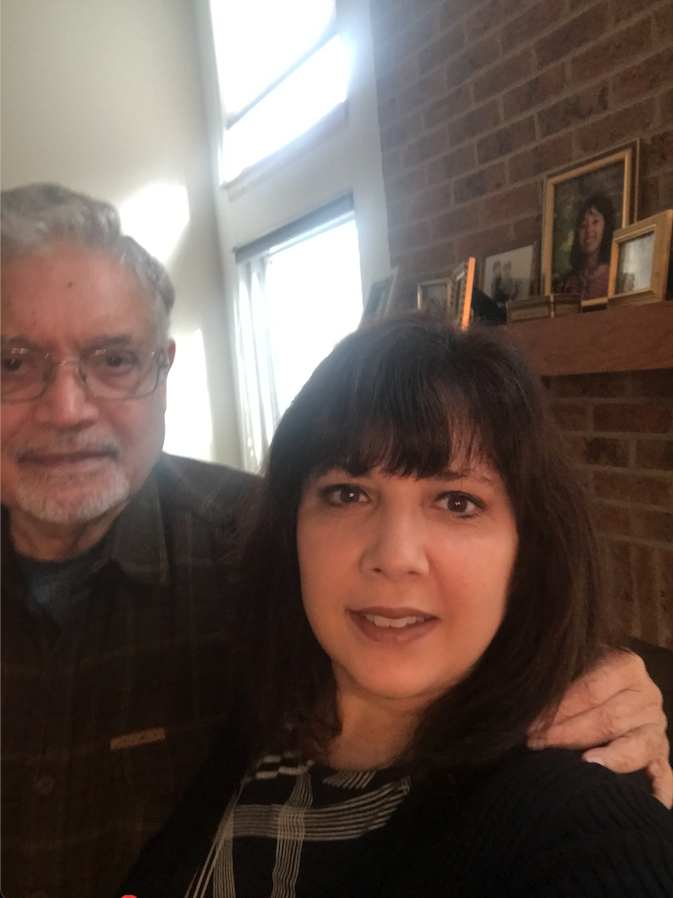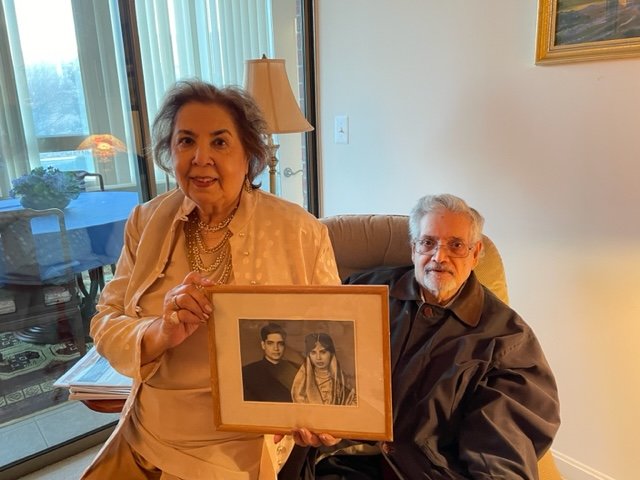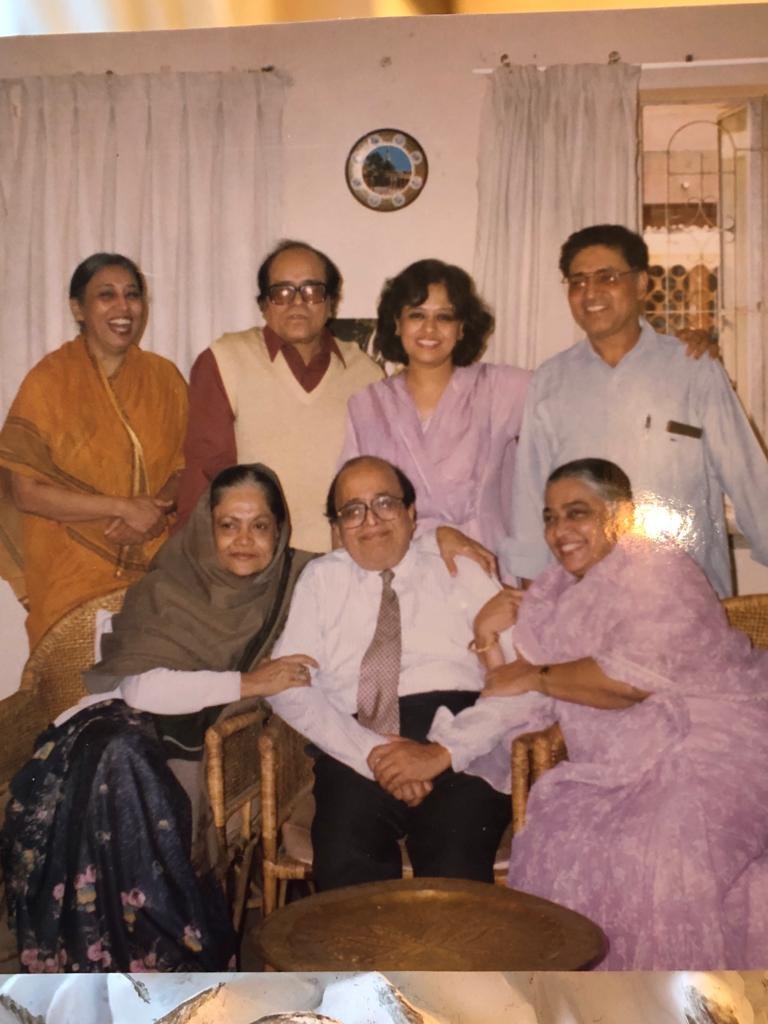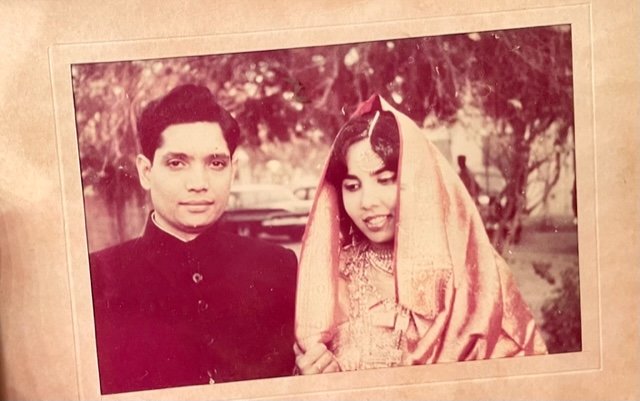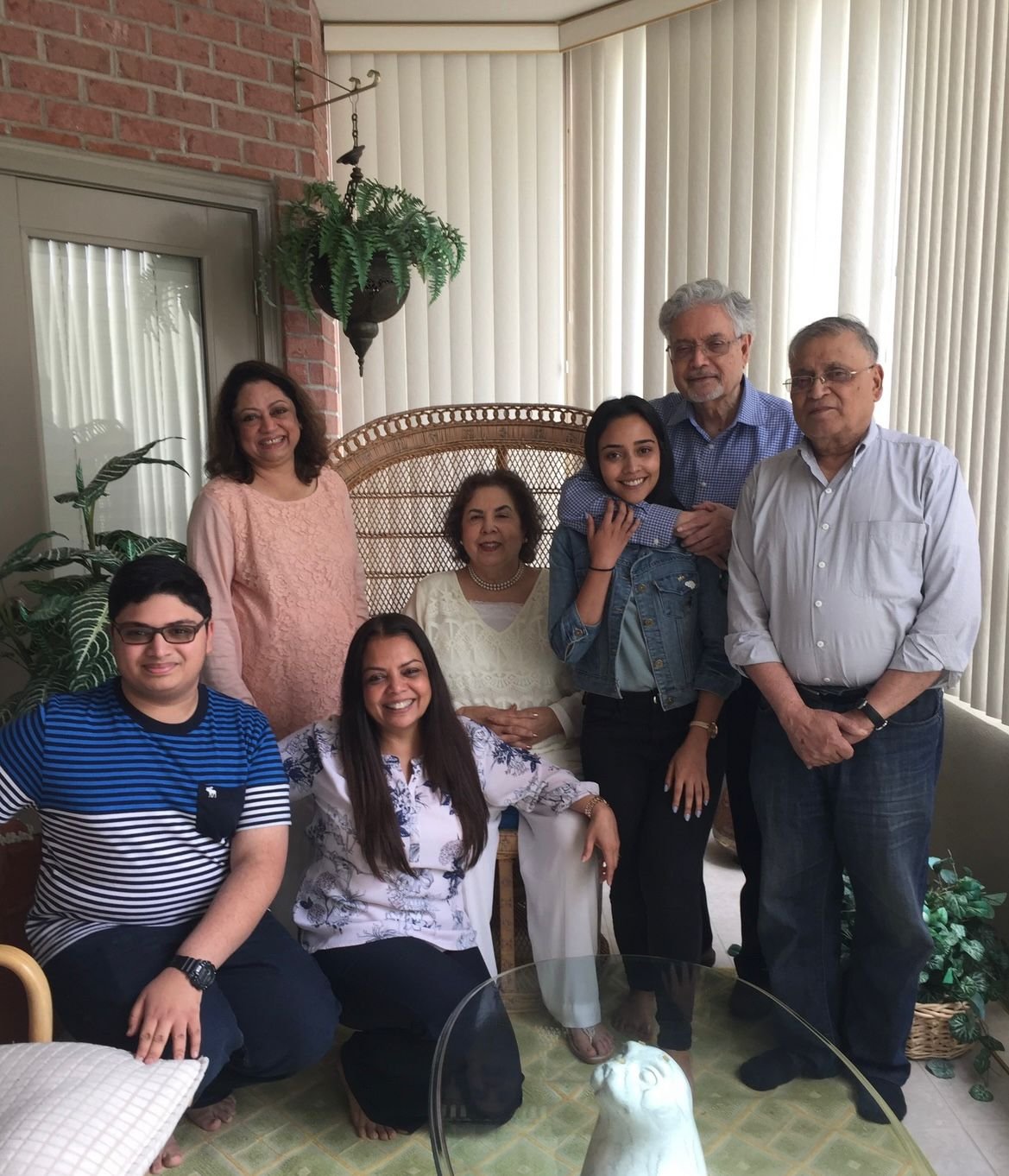My Abbu
Abbu’s 89th birthday.
My father-in-law was always a man of few words. But even without words, his presence was felt in any situation, through his dignity, solemnity, and elegant demeanor. When he did speak, his brevity defied the poignancy of his remarks—the message was always greater than the sum of his words.
On my father-in-law’s 89th birthday, which coincided with Father’s Day this year, we were sitting in his living room, various family members chatting about nothing in particular. Abbu was quiet, but present, no doubt in pain from his stage four cancer diagnosis; it was the first time in weeks (and the last) that he had left his bed to sit in his favorite recliner, covered by his favorite blanket.
By the end of the evening, we turned our attention back to Abbu, we were celebrating him after all, and my mother-in-law asked him, what would he like to say to us on this momentous occasion, what wisdom would he like to share from his 89 years. Without hesitation he said, why don’t you all tell me, what have you learned from my life’s story.
Such profundity in less than 10 words. While that evening we didn’t fully answer his request, his words never left me. On his passing this past week (Inna lillalhi wa inna ilahi raji’un), I’ve been reflecting on them more and more. My emotions are still raw and I can hardly type these sentences without tears, but I wanted to share my Abbu with you and mention a few things I’ve learned, and aspire to learn, from his life’s story, as he asked.
If I had to describe Abbu in one word, it would be dignified. From the way he looked and dressed—so dapper in tweed jackets, waistcoat, polished shoes, handkerchief, not to mention his full head of salt and pepper hair and goatee—to the way he spoke and carried and conducted himself, he was always dignified, worthy of respect, calm and composed, with gravitas (but with a dry sense of humor when needed). Abbu experienced so much in his nearly 90 years, from the birth of nations to several civil wars, from living in nearly a dozen countries to sharing life with Maman for 60 years, to the passing away of 8 of his 10 siblings, and the happy and sad moments that come with family, children, grandchildren, life. He dealt with every challenge with a quiet, solemn dignity; I pray I can learn that too.
It's because he had faith at his core. His faith guided him, consoled him, gave him comfort, purpose, and solace. For any difficulty, he would turn to God; it’s what got him through life. His faith was his internal compass and guided his external relations. It wasn’t a preachy kind of faith, he wouldn’t lecture us about it; but the strength and quiet confidence it gave him was palpable, we wanted to be wrapped around his duas too. Abbu never missed a prayer, never. No matter what he was doing, who he was with, what event or celebration he may have been attending, when it was time to pray, that’s the only thing he wanted to do. His internal clock, especially for maghrib prayer, was as precise as any Swiss watch; he would say it was like someone was calling him. What I found incredible was that even during his final weeks, whenever I went to his room, his eyes would be closed but his lips would be moving; his hands folded on his chest or clasped in supplication.
Abbu was disciplined to a tee—from when he woke up, to the stretches he did first thing every morning for nearly 80 years, to how much he ate, to his daily prayers, to his work and his leisure, and everything in between. He would never take more on his plate than he could eat, for example, and whatever he took he would finish to the last morsel. Abbu attributed his sense of discipline to his mother (see below).
Sometimes it’s the small gestures you notice about a person that stay with you. One of those for me is how Abbu would show appreciation for every little thing. If I brought him a cup of tea, he’d say thank you; turned off the TV… thank you; brought in the newspaper…thank you. Even just two weeks ago when I was staying with my in-laws to care for them, he continued to express his appreciation. He certainly didn’t have to for such small things at any time, and particularly not when he was enduring so much pain, but he did because that’s who he was. I’ll always remember these most recent quiet moments with him; I’d pop into his room every morning to check on him, still in my pajamas, and he’d smile in appreciation, knowing I had slept there the night before. When I left to go back home, he blew me kisses…
A photo of his mom that Abbu kept on his closet shelf.
Several years ago, when the 30 Days Ramadan theme was “wisdoms from our elders”, I asked Abbu what wisdom guides him; his response is included in the 30 Days book. (One of my greatest blessings is that Abbu was proud of me for having written this book and for capturing so many family stories; I loved seeing him read it.)
“My mother used to say to me, when I was 15 or 16, ‘if you’ve got nothing useful to say, stay quiet’,” Abbu tells me. “That’s why I listen more than I talk.”
“Some people talk for the sake of talking, but I talk if I have a reason, if I want to give someone advice. Unless it’s really necessary, I keep quiet.”
Abbu says he became even more quiet after his big brother passed away. “I got really shocked; after my father, Barai Bhayya was our main advisor. After he died, I talked very little.”
Abbu remembers another wisdom that he learned from his mother – discipline. As a young boy, Abbu loved to play sports and every day after school around 4pm he would run outside to play. His mother would call him back and say, “Hyder, where are you going?” To play soccer, he’d say. “First, pray Asr (afternoon prayer),” she would say. And he would.
Arif shared a beautiful wisdom that he learned from his father, before the Janazah prayers at ADAMS Center this week. “My father taught me to always hold my head up high,” Arif said, “to never bow to anyone or to any material thing—only to the Almighty; to have confidence in my faith and in God, and to be proud to be Muslim.”
In the 30 Days book, Arif talks about the power of his father’s prayers.
“Everything I’ve been able to do in my life is because of the immense power of my father’s prayers. There have been so many times that I could have gone wrong, but there’s something magical in Abbu’s prayers, something that comes directly from God, and that I feel gives me strength, gives me courage, keeps me safe, keeps all of us safe. There’s nothing more peaceful than seeing Abbu say his namaaz (prayers). I know that his prayers are for all of us and will keep us protected.”
Reading my 30 Days book.
The passing of my Abbu reminds me once again how important it is to capture our stories, especially that of our elders, while we have them with us. There is so much guidance and solace in their lived experiences and the perspectives they’ve gained. I’m grateful I asked my father-in-law and my father to share some of their stories; it’s what I turn to when I need them most. I know if I hadn’t asked them, or written them down, I would have easily forgotten.
In honor of our elders, I’ve decided to write one more 30 Days book—the third in the trilogy—which will focus on “wisdoms from our elders”, a treasury of sage guidance, big and small, to hold on to, for all of us. Hope you’ll join me and jot down the wisdoms from elders that guide you; hope you’ll share them with me too.
I hope the stories I share inspire you to capture your own, to ask people in your families about traditions and values they cherish. Hope you’ll take some time, as you meet family near and far, to ask and listen, and write and record. I can’t imagine anything more important than capturing our family stories and preserving them for future generations. And if I can help, it would be my honor.
Finally, as I consider you all part of my extended family, may I ask you to say a prayer for my precious Abbu, Syed Hyder Ali, for my dear Maman (Shireen), and for our family.
With all my love.
Please follow more inspiring stories on Instagram @salma.hasan.ali.
This is newsletter #33. If you know anyone who might enjoy this newsletter, they can subscribe for free here. A few past newsletters:
Let go and let God (Yusef Salaam)
Farhan Latif’s wisdom from his dad
Journalist Mehdi Hasan’s wisdom from his dad
A Letter of Gratitude, for my Husband’s Surgeon
Life Lessons for my Son, that I Learned this Week



